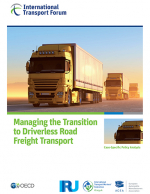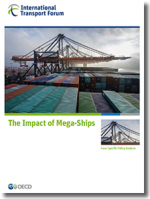The Impact of Mega-Ships
This report assesses if the benefits of the current mega container ships still outweigh their costs to the whole transport chain.
Container ships have grown incessantly over recent decades due to a continuous search for economies of scale by shipping lines.
In the past this has contributed to decreasing maritime transport costs that facilitated global trade.
However, the increase in container ship sizes and the speed with which that happens has consequences for the rest of the transport chain.
They require infrastructure adaptations and productivity levels that increase costs for port operators, port authorities and other stakeholders in the supply chain.
Moreover, mega-ships cause peaks in ports and put a strain on hinterland transports.
Has a tipping point been reached, where further increases in ship size result in disproportionally higher port and hinterland costs? What are the impacts of mega-ships for the whole transport chain, and what could be done to optimise the use of mega-ships and mitigate negative impacts?
This study aims to answer these questions through a detailed assessment of the consequences of mega-ships for the different parts of the transport chains: maritime transport, ports, terminals and hinterland transport.
- Cost savings from bigger container ships are decreasing
- The transport costs due to larger ships could be substantial
- Supply chain risks related to mega-container ships are rising
- Public policies need to better take account of this and act accordingly
- Further increase of maximum container ship size would raise transport costs
This report is part of the International Transport Forum’s Case-Specific Policy Analysis series. These are topical studies on specific issues carried out by the ITF in agreement with local institutions.
What’s Related


Favorites





